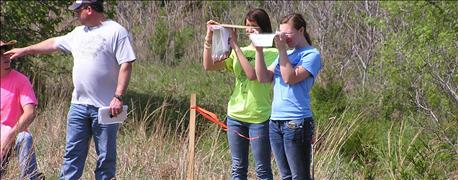
As coordinator of the State Land Judging contest for the past 20 years, it is safe to say that Ken Malone loves the land and soil. The longtime Palmyra FFA instructor notes that soil is the component that holds all of agriculture together.

SEEING THE LAND: These students are measuring land slope in a recent State Land Judging contest. "Soils, land and home-site evaluation provides a setting for students to investigate the soils in their region," says Ken Malone, State Land Judging coordinator and Palmyra FFA instructor. (Photo courtesy of Ken Malone)
"The soil provides a base on which to live, build and enjoy the beauty of nature, and soil quantity is limited and its quality is varied," Malone says. "Land is a natural resource that gives us many opportunities to provide for our needs. Most raw materials are provided by the land." So, decisions we make in land use impact not only how much usable land remains, but how well that remaining land will provide for our needs and those of future generations, he explains.
"Our management practices reflect our knowledge, or lack thereof, about soils and the related environmental factors at any given time," says Malone. In land judging, students become familiar with terms used to describe soils and understand basic soil differences. They learn how differences in soils impact plant growth, and they can recognize influences of different land features on plant production and land protection. Students select suitable soil and water conservation practices to protect and conserve the land, and they determine land capability classes for crop production. They become versed at interpreting soil classifications and learn to make recommendations for proper land use and treatment. They also can evaluate land for potential non-agriculture uses, and recognize the environmental impacts of agriculture and other land use.
"Soil, land and home-site evaluation provides a setting for students to investigate the soils in their region, the environment that surrounds them and their impact on their daily lives," Malone says. "Soil takes long periods of time to develop, but it can be destroyed or eroded away in very short periods. It is only through proper stewardship of soil that life on Earth can be sustained and improved."
That's what it all boils down to in the land judging contest, according to Malone. "Soil supports and influences the crops we grow for food and fiber, the water we drink and the air we breathe," he says. "The soil acts as a filter for the water entering the groundwater supply, as well as interacting with or being eroded by the water that flows over the surface."
Malone gives high praise to the Nebraska Association of NRDs, Nebraska Natural Resources Conservation Service and agriculture educators across the state for assistance with the land judging program. "They are the driving force for Nebraska's natural resources," he says.
If you'd like to learn more about the State Land Judging contest, go to nrdnet.org/nebraska-land-judging-soil-evaluation.
About the Author(s)
You May Also Like






